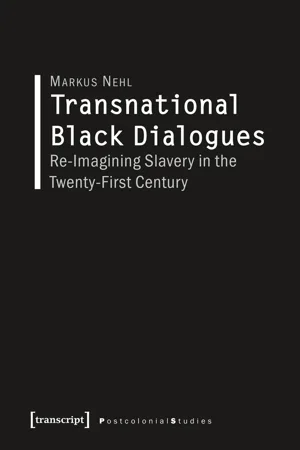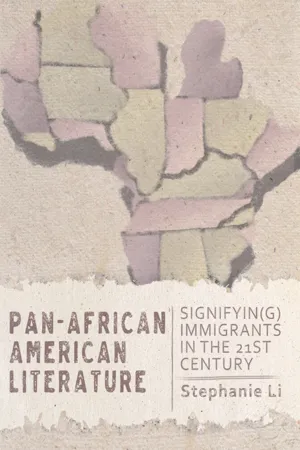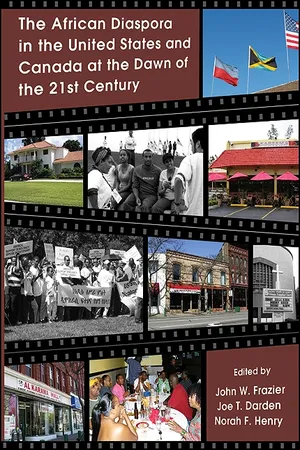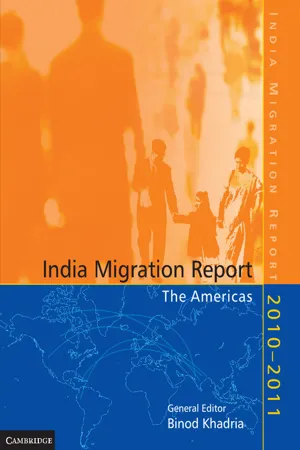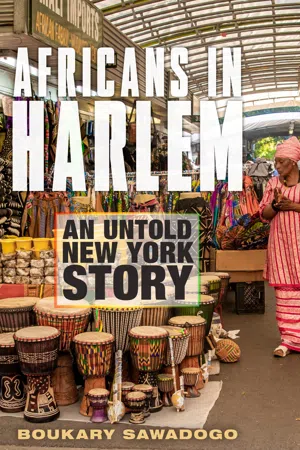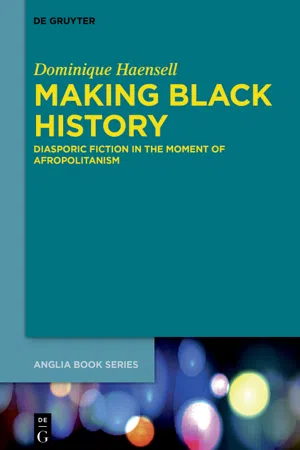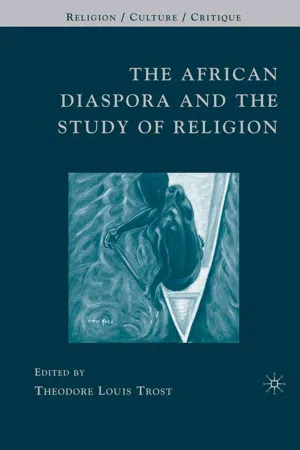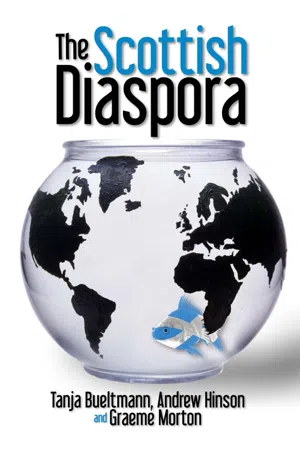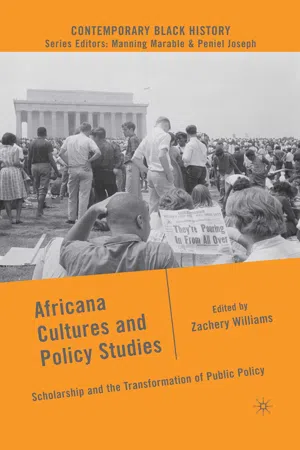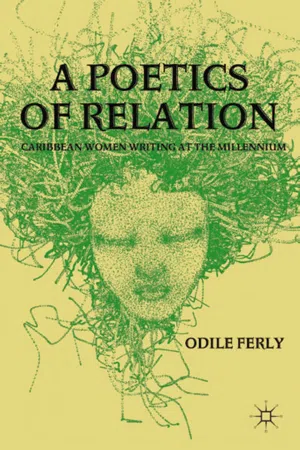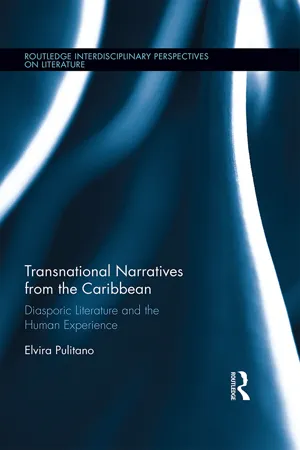Literature
African American Diaspora
The African American Diaspora refers to the dispersion of African-descended people from their ancestral homeland to various parts of the world, particularly the Americas. In literature, this concept is often explored through the themes of identity, cultural heritage, and the impact of displacement on individuals and communities. Writers from the African American Diaspora often use their works to reflect on the experiences and struggles of their people.
Written by Perlego with AI-assistance
Related key terms
1 of 5
11 Key excerpts on "African American Diaspora"
- eBook - PDF
Transnational Black Dialogues
Re-Imagining Slavery in the Twenty-First Century
- Markus Nehl(Author)
- 2016(Publication Date)
- transcript Verlag(Publisher)
They have focused on a wide range of diasporic themes, such as the scattering of black communities in the context of the transatlantic slave trade or the role of 1 | See Martin Baumann, “Diaspora: Genealogies of Semantics and Transcultural Com-parison,” Numen 47.3 (2000): 313-18. 2 | Ibid. 317. 3 | Ibid. Transnational Black Dialogues 40 the African mother continent. 4 However, as sociologist Robin Cohen empha-sizes, over the centuries, “the classical use of the term, usually capitalized as Diaspora and used only in the singular, was mainly confined to the study of the Jewish experience.” 5 It was only in the second half of the twentieth century, in the context of decolonization movements in Africa and the Civil Rights move-ment in the United States, that historians and intellectuals started to employ the term African diaspora to address “the status and prospects of persons of Af-rican descent around the world as well as at home.” 6 Since then, in the academic world and in popular discourse, diaspora has become a widely used concept to reflect on questions of black identity, home and belonging and to analyze power structures, processes of exclusion and forms of black resistance. In particular, in many studies and discussions, it is employed as a framework to shed light on aspects that connect black individuals and groups across national and cultural borders. 7 As the historian Tina M. Campt notes, given its popularity, diaspora is often seen as “ the requisite approach or theoretical model through which one should (or perhaps must) understand all formations of Black communi-ty, regardless of historical, geographical, or cultural context.” 8 Of course, this development is problematic: As a mere buzzword without paying attention to the specificity of a given black group, the notion of the African diaspora has no analytical value. - eBook - PDF
Pan–African American Literature
Signifyin(g) Immigrants in the Twenty-First Century
- Stephanie Li(Author)
- 2018(Publication Date)
- Rutgers University Press(Publisher)
The texts I examine 4 Pan-Afric an A meric an Liter ature here deliberately signify on the African American literary canon to encompass new experiences of immigration, assimilation, and identification that challenge how blackness has been previously conceived. Most academic work on the expanding presence and influence of recent African immigrants and their descendants in America has been sociological in nature. Texts like The Aican Diaspora in North America (2006) by Kwado Kondadu-Agyemang, Baffour K. Tayki, and John A. Arthur, The Other Aican Americans (2007) by Yoku Shaw-Taylor and Steven A. Tuch, and Young Children of Black Immigrants (2012) by Randy Capps and Michael Fix have been instru- mental in describing patterns of education, labor, and political participation as well as shifting views on social issues. More recent texts like Rethinking Ai- can Cultural Production (2015) and a 2016 special issue of the Journal of Aican Cultural Studies have begun to consider the literary and artistic contributions of the new African diaspora. However, as both of these titles suggest, scholars have largely engaged authors like Chimamanda Ngozi Adichie and NoViolet Bulawayo from an African perspective. While such an approach provides a nec- essary foundation for understanding literature by writers born in Africa, this study offers another way to think through the start of a new literary renaissance. Rather than read these texts as African or specific to the national homelands of their authors, I consider them as part of an ever-expanding African American lit- erary tradition. They significantly reframe our understanding of black migration by presenting diaspora as not solely defined by the traumas of the Middle Pas- sage. Instead, migration is figured as a continuous and generative back-and-forth across the Atlantic. - John W. Frazier, Joe T. Darden, Norah F. Henry, John W. Frazier, Joe T. Darden, Norah F. Henry(Authors)
- 2010(Publication Date)
- SUNY Press(Publisher)
Although “diaspora” provides multiple conceptualizations, a broad interpretation of the term permits greater understanding of various diasporic groups because the timing and conditions of migration vary. Traditionally, African Diaspora studies have focused on people of African descent outside Africa, or within Africa but far from their birthplace. With emphasis usually on large movements and relocations resulting in the global dispersal of Africans and their descendants, and the transatlantic slave trade of the 15th to 19th cen- turies, scholars disagree on what constitutes the African Diaspora. Some scholars focus on the dispersion of Af- ricans through the slave trade; others define the African Diaspora as the connections of people of African de- scent around the world, who are linked by their common experiences and their genetic makeup (Gomez 1998). Forced migration and racialization are key components of an earlier African Diaspora in the United States, but African Diaspora history is not always rooted in slavery. During voluntary migration in the late 19th and early 20th centuries, people of African descent continued to immigrate to the United States, making racialization im- portant, but not a key component of this African Diaspora. Thus, the role of African and West Indian migrants to the United States in the post-slavery era is blurred. Are they part of the African Diaspora or merely immigrants? The term diaspora (and its definition) is similarly blurred. Some argue that it is too broad and has the potential for encompassing every movement of Africans over long periods of time. Its application to more recent groups of Africans is inaccurate. Those who employ the term need to clarify the distinction between diaspora and other forms of movement, such as migration.- eBook - PDF
India Migration Report 2010 - 2011
The Americas
- Binod Khadria(Author)
- 2012(Publication Date)
- Cambridge University Press(Publisher)
The following discussion provides a perspective on some of these diasporas in the Americas for the purpose of comparison with the Indian diaspora communities in various countries of the Americas as presented in the earlier chapters. 6.1 The African Diaspora The success of the African–American diaspora substantiates the influence of hyphenated identities in the United States (Shain 1994–1995). In the context of the African diaspora, it is noteworthy that whereas other diasporas are defined in national or ethnic or even ideological terms, for Africa they are simply called African, irrespective of whether it means racial or spatial identity. Another common description of African diaspora is ‘black’, which is unique in the sense that diasporas from other regions are rarely identified by colour. Whatever the politics of this nomenclature, the point is that, unlike the African, other diasporas generally have ethnic, national, or religious identities (Zeleza 2005). The formation of new African diaspora increased at a gradual pace during the course of the twentieth century and accelerated thereafter at the turn of the century. Walker’s (2001) notion of three puzzles provides a way of thinking through these issues. She suggests that the African diaspora in the Americas ‘represents the intersection of at least three planes of multidimensional, intersecting, and interdependent puzzles’, what she calls ‘the transitional African puzzle’, ‘the puzzle of the African diaspora per se’, and the ‘Pan–American puzzle’. The first refers to the question of those African cultures that have, over the past five centuries, managed to establish more or less evident, overseas outstations in the Box 6.1: Common Features of a Diaspora Building on Safran (1991), Cohen (2010: 17) has elaborated on the common features of a diaspora: 1. Dispersal from an original homeland, often traumatically, to two or more foreign regions; 2. - eBook - PDF
Africans in Harlem
An Untold New York Story
- Boukary Sawadogo(Author)
- 2022(Publication Date)
- Empire State Editions(Publisher)
This experience has provoked me to constantly readjust and define my own Blackness—a formative journey and experience that has probably all along the way planted the seeds of this book. The journey across the Atlantic that led me to Harlem may be my own personal awakening moment within the larger cultural-historical question of the relation immigrants have to their adoptive neighborhood, their ties as newcomers to a community in which they become fully integrated and accepted members. Local stories and histories reflect and constitute the multiple journeys of community members, some of those members coming from afar. SEARCHING FOR AFRICA IN THE DIASPORA · 149 The Search for Africa Portrayed in Film The search for Africa in the diaspora is the subject of several films by African directors. These screen media productions often take the viewer on the journey of protagonists leaving Africa to trace descendants of for-mer slaves in the Americas. Often, the quest takes the form of a spiritual journey of self-discovery for the protagonist, and an encounter with Africa for the diaspora. The most illuminating examples of such films for my purposes here are Black Goddess or A Deusa Negra (1978) by the Nige-rian director Ola Balogun, Little Senegal (2001) by the Franco-Algerian director Rachid Bouchareb (treated in Chapter 6), and Bigger Than Africa (2018) by the Nigerian filmmaker Toyin Ibrahim Adekeye. 2 These three films examine how West African culture has survived the slave trade and the plantations to date in Brazil, Cuba, Haiti, the United States, and the Caribbean. The narrative appears to suggest—though to a lesser degree in Little Senegal —that African culture, religions, and spirituality are best preserved in the diaspora. Maybe Africans should look to the diaspora to learn more about their own history and culture. Clearly this is not a quest for purity or a bid to return to an imagined or dreamed Africa that may have never actually existed. - eBook - PDF
Making Black History
Diasporic Fiction in the Moment of Afropolitanism
- Dominique Haensell(Author)
- 2021(Publication Date)
- De Gruyter(Publisher)
She claims that what might have served as a “ powerful point of reflection: a reckoning in the form of unity, ” has “ not occurred ” (ibid.). Yet the literary explorations discussed in this book – cautious of and attentive to its dilemmas and mobilized by a deep-seated diasporic desire – certainly belie this pessimist statement. Indeed, all three novels convey what British-Sierra Leonean writer Aminatta Forna de-scribed in an interview: a nuanced understanding of how “ the legacy of slavery courses affect each other reciprocally, and that the diasporic discourse of Afropolitanism is not a byproduct of its continental counterpart, just as the diaspora is not a mere byproduct of Africa. 38 Chapter I: Introduction – Writing Race in the Moment of Afropolitanism breaks differently on each side of the Atlantic. ” Moving to the US, Forna elabo-rates, allowed her to discover a “ sharp distinction in how she claims her past and how others view that history through skin color ” (Otosirieze 2017: para. 12). We find this realization in all three texts, along with the same willing-ness or desire to explore and perhaps blunt the sharpness of this distinction through reckoning with that history, formally and thematically. As such, the Black Diaspora reveals itself as a geographical space, mutually constituted by both homeland and diaspora, as well as a distinctly temporal community that is both imagined and probed by these texts. Acknowledging rec-iprocity thus also means understanding that the Black Diaspora is in fact this Janus-faced entity, mobilized by the push and pull of homeland and diaspora, past and future. What I aim to show in my readings of Afropolitan fictions is that while the shift toward imagining diaspora under the sign of Africa certainly correlates with post-racial discourses, these processes aren ’ t necessarily mutual-ly defined and much less causally related. Newly Black Americans may question the category of Blackness, but they are nevertheless Black. - T. Trost(Author)
- 2007(Publication Date)
- Palgrave Macmillan(Publisher)
The dynamics of these cultural exchanges and ongoing debates about authenticity are especially relevant for the pre- sent discussion of Dett’s struggles, but they are also part and parcel of the intellectual work shaping the historiography of the African diaspora. In one of the earliest anthologies, Global Dimensions of the African Diaspora, editor Joseph Harris reminds readers that “issues related to assimilation and identity are basic to an understanding of the African Diaspora” and “all the chapters confirm” this idea, including St. Clair Drake’s important chapter, “Diaspora Studies and Pan-Africanism,” which focuses on the cultures of Africans in the Americas (1982: 8–9). Michael A. Gomez advances a similar argument in his discussion of African agency and conscious decisions related to acculturation in Exchanging Our Country Marks: The Transformation of African Identities in the Colonial and Antebellum South: It is the synthesis that best characterizes the activity within the volitive realm of acculturation. In music, art, folklore, language, and even social structure, there is sufficient evidence to conclude that people of African descent were carefully selecting elements of various cultures, both African and European, issuing into combinations of creativity and innovation. Such a process is consistent with the nature of viable cultures; that is, they have the capacity to change and adapt when exposed to external stimuli. (1998: 10) These themes are repeated in many other studies of the African diaspora (Holloway 2005; Gomez 2005; Walker 2001). Together the analyses provided by these scholars suggest that Dett’s activities, rather than being unusual, were in direct keeping with choices that millions of Africans in diaspora had made in earlier generations. The tasks associated with collect- ing, arranging, and then interpreting both the musicality and the ideology of the spirituals, however, was left to Robert Nathaniel Dett and his gen- eration.- eBook - PDF
- Tanja Bueltmann, Andrew Hinson, Graeme Morton(Authors)
- 2013(Publication Date)
- Edinburgh University Press(Publisher)
The category of diaspora, traditionally associated with the movement of people, is an old one, but the concept of diaspora is relatively recent. Scholars have struggled to master either form because of the need for both interdis-ciplinarity and empirical knowledge of more than one national history. The observation that all of the world’s peoples today can be regarded as part of the earliest diaspora out of Ethiopia and Africa more generally is suggestive of the challenge. 1 Moreover, migration in not unique to any one period: throughout dIASPORA: dEFINING A CONCEPT 17 human history people have walked and sailed to other places, often in tribes, groups or communities, and only archaeological evidence survives to illumi-nate journeys where no written records lie extant. For illegal immigrants it can be that records are created only after arrivals have been recognised by authori-ties, sometimes after generational distance. Yet as more and more variation of human experience is brought forward, allied to the inherently international and comparative nature of what is being described, a greater analytical range of instances compels us to adapt or replace previously established paradigms of diaspora. Consequently scholars such as Rogers Brubaker and Cairns Craig have questioned the validity of the very concept itself. 2 They, and those who follow their reasoning, argue that the term diaspora has lost functional value by its uncritical application to all kinds of migratory experiences. This bloating is all the more noticeable because the concept began from very narrow origins. A AN EPISTEMOlOGY OF dIASPORAN STUdIES From his standpoint as editor of the academic journal Diaspora , Khachig Tölölyan responded to the many examples of diaspora he encountered by inviting the journal’s readership to submit illustrations of the most egregious deployment of the term in popular culture. - eBook - PDF
Africana Cultures and Policy Studies
Scholarship and the Transformation of Public Policy
- Z. Williams(Author)
- 2009(Publication Date)
- Palgrave Macmillan(Publisher)
Researchers in the 1970s began to adopt a different model for understanding such African retentions exhibited throughout African American culture. Led by Sidney Mintz, anthropologists began to develop a model of the African Diaspora that emphasized innovation and adaptation of black cultures to New World real- ities. They argued for the development of a hybrid or Creole culture. 5 This new model saw blacks as not slavishly fighting to preserve African cultural artifacts but, rather, as drawing upon their African past in a pragmatic fashion, as well as New World resources, with the aim of producing structures necessary for mak- ing sense out of a world turned upside down. The emphasis here is “on cultural mixture and blending, rather than particular retained African cultural traits and traditions.” 6 Kristin Mann points us to “a creative new way of conceiving the relationship between Africa and the Americas” by those working in the “Diaspora from the 250 TIM LAKE Nigerian Hinterland Project, a major international collaborative research effort.” Mann describes the project as assuming “that persons born in Africa carried with them into slavery not only their culture but also their history, and that if we understand the experiences of slaves and the histories of the societies from which they came, then we will be able to trace these influences into the diaspora.” 7 She continues, The focus in this research moves beyond Herskovits’s earlier quest for African “sur- vivals,” disconnected from time, by situating African influences in specific histor- ical context and viewing them as part of continuous historical experience . . . At their boldest . . . [scholars argue] for extending the boundaries of “African history” to include the history of Africans in the diaspora. - eBook - PDF
A Poetics of Relation
Caribbean Women Writing at the Millennium
- O. Ferly(Author)
- 2012(Publication Date)
- Palgrave Macmillan(Publisher)
Evelyn O’Callaghan likewise points out that there is much to be gained from diasporic writing, which brings “new perspec- tives on ‘home’ as well as searching questions about [the authors’] place in the metropole” (Woman Version 4). J. Michael Dash notes that René Depestre con- ceives exile as “an almost inevitable process of ceaseless transformation” (Haiti and the United States 125). Depestre thus claims that the multiple identity he forged in exile, his “identité-banian,” is nourished both by his native town Jacmel, the “chez-soi insulaire” (the insulary “at-home”) and by his adopted French home, the “chez-l’autre hexagonal” (the Hexagonal “at-the-other’s”) (Le métier à métisser 210). As Haitian critic Jean Jonassaint puts it, the phenomena of exile and dias- pora literature now require a cultural redefinition (“Haitian Writers in Exile”). Jonassaint is echoed by Condé, who calls for a redefinition of “Caribbean litera- ture” (her quotes), adding that she wonders whether “the old categories of race, nationality, and territory to which we cling are not becoming obsolete” (Penser la créolité 30 [translation mine]). It seems therefore appropriate to conclude this analysis of millennium female narratives with diasporic writing (Julia Alvarez, Suzanne Dracius, Cristina Garcia, and Edwidge Danticat). Here the Caribbean enters in Relation with its respective metropoles or any neocolonial center, linking the two terms with cultural bridges. The paradigmatic mangrove facilitates the examination of these intensified exchanges, emphasizing the constructed nature of any composite identity. “Language Shift”: Haitian and Hispanophone Caribbean Writing in English Bilingualism is common to many emigration stories. For a diaspora writer, this phenomenon—which could be called “language shift”—acquires particular sig- nificance. Since diaspora writers frequently draw inspiration from the native - eBook - ePub
Transnational Narratives from the Caribbean
Diasporic Literature and the Human Experience
- Elvira Pulitano(Author)
- 2016(Publication Date)
- Routledge(Publisher)
Part IDiasporic HomelandsBut can’t you even imagine what it must feel like to have a true home?—Toni Morrison, ParadiseIn Cartographies of Diaspora , Avtar Brah argues that “the concept of diaspora places the discourse of ‘home’ and ‘dispersion’ in creative tension, inscribing a homing desire while simultaneously critiquing discourses of fixed origins ” (192–3). When does a place become home for diasporic peoples forced for one reason of another to leave their original homelands? What does it mean to feel at home as opposed to be at home or have a true home , as the group of African Americans in Toni Morrison’s Paradise poignantly reminds us? Descended from freed slaves, driven from their home in Haven, wandering across America in a sort of ironic reversal of the pioneering journey, this group of displaced Black Americans epitomize the ambivalence of home for the descendants of the African diaspora as a result of the loss of the ancestral homeland. “To lose your mother,” Saidiya Hartman argues as she reflects on the effects of slavery on African and African American histories, “was to be denied your kin, country, and identity” (Lose Your Mother 85).Recent theoretical investigations of diaspora have drawn attention to the creative, enriching aspect of a diasporic, transnational identity, which often results in individuals shifting to and from multiple homes. Diasporic subjects live a liminal existence in constant tension between “where you’re from and where you’re at”—to use the tile of one of Paul Gilroy’s provocative essays (Small Acts 120)—while continuously re-mapping the boundaries of home at a time when contemporary critical discourse tends to favor the “the instability of ‘home’ as a referent” both globally and locally (Bammer, “Editorial” vii).For Danticat, Phillips, Kincaid, and Cliff, the notion of home bears all the complexities of the double diaspora theorized by Hall when describing the Caribbean situation. As descendants of diasporic communities first and migrant subjectivities second, these writers inhabit a home that is vexed with ambiguity and contradiction, a locality whose boundaries are not clearly defined and/or definable, but a home that nonetheless they attempt to claim in the discursive space of their fictions. From their characterization, far is the myth of an original homeland as a space providing some kind of ontological security. Haiti, Jamaica, Antigua, Africa, England become instead locales through which to interrogate the construction of home
Index pages curate the most relevant extracts from our library of academic textbooks. They’ve been created using an in-house natural language model (NLM), each adding context and meaning to key research topics.
